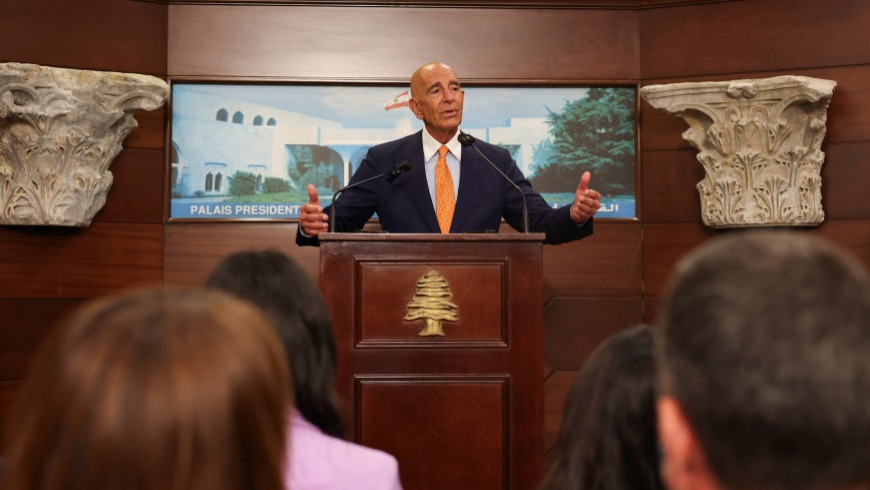The United States Special Envoy to Syria, Thomas Barak, confirmed on Monday that a dialogue has officially commenced between Syria and Israel. He also underscored the need for a fundamental shift in Lebanon’s stance toward the regional peace process.
Speaking at a press conference in Beirut following a meeting with the Lebanese president and other senior officials, Barak said the discussions focused on disarming Hezbollah and exploring avenues for opening dialogue with Israel.
Barak described his meetings with Lebanese officials as “remarkably successful,” expressing satisfaction with Lebanon’s preliminary response to Washington’s proposal regarding Hezbollah’s disarmament. He noted that the response fell “within the framework” of what the U.S. hopes to achieve.
He emphasized that it is the responsibility of the Lebanese state to address Hezbollah as a political party, adding that the group must feel it has “a future within Lebanon’s political system.”
On the subject of ongoing tensions along Lebanon’s southern border, Barak acknowledged repeated ceasefire violations by Israel but insisted that “Israel remains committed to peace with Lebanon.” He revealed that Washington is currently developing a comprehensive plan for Lebanon’s future, given the deep mistrust between Israel and Hezbollah.
U.S. Offer: Israeli Withdrawal in Exchange for Disarmament
During his previous visit to Beirut on June 19, Barak presented a proposal calling for the disarmament of Hezbollah within four months, in return for a phased Israeli withdrawal from several positions in southern Lebanon and a cessation of Israeli airstrikes, according to Reuters.
Diplomatic sources reported that Lebanon has formed a committee to draft an official response to the U.S. proposal. Hezbollah, in turn, is expected to submit its feedback to Speaker of Parliament Nabih Berri, who is tasked with coordinating Lebanon’s official reply during Barak’s current visit.
Syria–Israel Negotiations
In recent weeks, reports of direct contacts between Syria and Israel have grown increasingly frequent and credible, transitioning from mere leaks to semi-official statements. Most notably, Israeli National Security Council chief Tzachi Hanegbi announced that he was personally overseeing ongoing political and security dialogue with the Syrian government.
According to Israeli news outlet i24NEWS, citing well-informed Syrian sources, the two sides are reportedly preparing to sign a peace agreement before the end of 2025. The proposed agreement includes a gradual Israeli withdrawal from territories seized during its December 8, 2024 incursion into the buffer zone, including Mount Hermon (Jabal al-Sheikh), a key strategic position in the Golan Heights.
No Peace Without Full Golan Withdrawal
In recent days, Israeli officials have dismissed the possibility that Syrian President Ahmad al-Sharaa would agree to any peace deal without a complete Israeli withdrawal from the occupied Golan Heights. They view Syria’s insistence on regaining all of the territory as a major stumbling block to a final agreement.
Israel’s Yedioth Ahronoth newspaper quoted senior Israeli officials saying that current negotiations are focused on a potential security agreement, rather than a formal peace treaty. These talks are being held with both regional and international mediation, including discreet U.S. involvement through back channels.
Syria Demands 1974 Agreement and Halting Israeli Strikes
Meanwhile, Asharq Al-Awsat quoted sources close to the Syrian government who said that Damascus is demanding a halt to Israeli airstrikes on Syrian territory and a return to the terms of the 1974 Disengagement Agreement. While Israel is pushing for a new demilitarized zone, the sources indicated that a revised security arrangement could pave the way for a broader peace deal in the future.
These sources also stated that Syria, as a newly reconstituted state, is not currently in a position to sign a permanent peace treaty. The more realistic option, they argue, would be a temporary or modified security agreement or a return to the 1974 deal. They cited continued—albeit less vocal—public opposition to normalization with Israel, internal political instability, and the presence of extremist factions operating outside the authority of the state who reject the very idea of peace.


